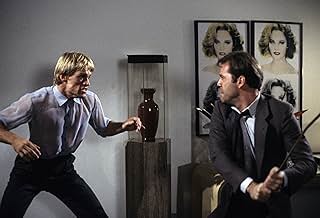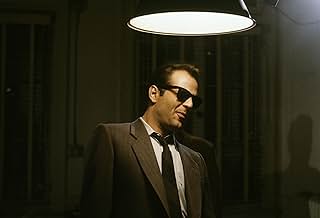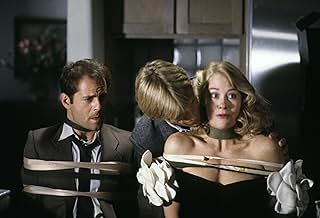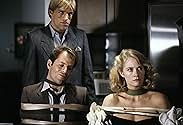Die kuriosen Fälle eines ehemaligen Modells und eines intelligenten Detektivs, der eine private Detektei leitet.Die kuriosen Fälle eines ehemaligen Modells und eines intelligenten Detektivs, der eine private Detektei leitet.Die kuriosen Fälle eines ehemaligen Modells und eines intelligenten Detektivs, der eine private Detektei leitet.
- 6 Primetime Emmys gewonnen
- 19 Gewinne & 60 Nominierungen insgesamt
Empfohlene Bewertungen
Shepard, who plays Maddie Hayes, wakes up one morning to find out her accountant has absconded with the fortune she made as a high fashion model. Obviously it was not a stretch for Cybil to adapt to this role! In the course of finding out that she needs to sell everything, she happens in on this little detective agency(Blue Moon), she owns only because it was a great tax writeoff. The staff is morabund, and the head sleuth is a wise cracking obnoxious male chauvenist named David Addison, played by an unknown(at the time) Bruce Willis. The immediate rapport between the two brought viewers back for more. The endless stream of double entendre's, malaprops, and overall office antics made the show lovable and audiences craved for more.
Glenn Gordon Caron's writing and vision had the writers, actors, and directors take license with certain rules in primetime that were never questioned. E.G. In one particular episode Maddie asks David to get more explicit with an explanation and David responds by telling her if they get any more explicit they'll have to move the show to cable. It is precisely these departures from the norm, along with the genius idea to have the two main characters talk to each other AT THE SAME TIME, that made critics and fans follow their every move.
It's probably best to say that this show's run was cut short due to the emergence of Willis as a bonafide star. Once he made his mark on the big screen, in Die Hard, Bruce was looking for ways to exit TV. In interviews he talked of the brutal schedules for TV primetime and the difficulty in exploring the boundaries of his talents and appetite for acting. As the show fragmented the practice of in season repeat episodes was probably accepted more , if not born out of necessity. Expanded roles were given in onscreen time and plots to Allyce Beasley(who played a great Agnes DiPesto) and her Blue Moon boyfriend Herbert Viola, played by Curtis Armstrong. These shows were often almost difficult to watch, through no fault of Beasley and Armstrong, but rather the desire to see Maddie and David cavort as usual.
Reruns have been syndicated and you can find them sometimes, most recently on cable channel BRAVO. If you do see the shows, and they are regularly scheduled, it would be well worth it to look for four of my favorites...the first episode of Moonlighting's second season entitled "Brother Can You Spare A Blond", a later episode when Maddie and David have had one of their innumerable fights and they are both interviewed by Rona Barrett in an attempt to reconcile their differences, the episode that co-stars Dana Delaney as the ex-fiance that jilted David, and a classic show guest hosted by Orson Welles shot just before Welles' death. The show signifies the great love/hate relationship between the two main characters and is brilliantly shot in both color and black and white. I think you'll get the spirit and essence of this show if you see any of these.
By the third episode it was clear they were on to something original, or if not completely original, at least written and executed better than anything else on TV at the time. The Tracy-Hepburn like sparring between Shepherd and unknown actor Bruce Willis, and the sophisticated writing by Caron and the other writers just got better and better as they finished their first half season of ten episodes.
The highlight of that first batch was the celebrated "black and white" episode, "The Dream Sequence Always Rings Twice." In it Maddie and David interview a client who owns a once famous LA nightclub (like the Coconut Grove), which is about to be torn down. There they learn of a mysterious murder that occurred there in the 40's, still unsolved, that revolved around a trumpet player having an affair with the band's married girl singer. The singer's husband was killed and both the trumpet player and the songstress claim the other did the deed. Of course David assumes the woman framed the musician. Maddie feels it was much more likely the sleazy guy did it. Each of them daydream their version of events in 1940's black and white, with Bruce playing the trumpeter and Cybill the singer. Each of their mini-stories works as film noir homage, and the pairing of the two versions come off even stronger. In addition it allowed us to see David and Maddie in a romantic setting without having to put the characters directly into that kind of plot killing situation. The episode won Emmy nominations for everyone involved, including Cybill and Bruce. Bruce won.
Which brings up "the troubles." How many giant egos can one series sustain? Tension began to mount between Shepherd, Willis, and Caron. Cybill was the "star" - but she was essentially playing straight man to Willis. His manic character and split second timing were the force driving the chemistry forward. By the time they were filming the first full season - he was as recognizable as she was. And after years of struggling and starving in New York - he was enjoying every minute of his new found fame.
And then there was Glen Gordon Caron. He was very much a "hands on" producer and had very definite ideas about where he wanted to take the series. His perfectionism frustrated his cast and writers. Several times the crew would begin filming an episode while the writers were still writing. Caron had a commitment to the network for 22 episodes per season. He never delivered more than 20. His shooting regularly went off schedule and over budget. The quality was there on the screen ("Atomic Shakespeare" - a riff on the Taming of the Shrew was practically a movie in and of itself), but the show began to tick off viewers who complained about all the reruns while they waited for a new episode.
As the series moved into its second full season it hit a creative peak:
· The aforementioned Taming of the Shrew
· Big Man on Mulberry Street - with a musical sequence by "Singing in the Rain" director Stanley Donen
· The four Sam and David and Maddie episodes with Mark Harmon as the straight up astronaut whose proposal forces Maddie and David to confront their feelings.
Then it happened. A confluence of events that seemed to drain the show of all its life:
· Maddie and David "did it" - killing off the eternal suspense.
· The writers, tired of all Caron's tirades and very much in demand with all their Moonlighting awards, left the series. Caron had to bring in a fresh crop.
· Cybill Shepherd became pregnant with twins. The timing of the pregnancy would prevent her from filming between September and at least December - a prime production period.
· Glen wrote the pregnancy into the show - and had Maddie flee LA for home - for months. This allowed him to film Shepherd's scenes alone during the summer. Of course with 3000 miles between Maddie and David it's hard to get much zippy chemistry going.
Coming from the creative high of the second season, the letdown in the third year was all the more apparent. By the time they dumped the baby (a miscarriage) at the beginning of the fourth season - the magic was clearly gone. Shepherd and Willis were anxious to move on to more lucrative film projects, and the final season was only a slight improvement over the disappointing previous year.
But, as the nursery rhyme goes - when it was good, it was very very good. In addition to the episodes mentioned above, try to catch some of these on cable:
· "My Fair David" - Maddie bets David can't go through a week without breaking out into some Motown ditty, or making crass sexist comments.
· "Devil in the Blue Dress" with Judd Nelson and Whoopie Goldberg
It dared to take a normal type of show - the detective show - and turn it into a mind blowing experience as it's battling heroine and hero confronted cases, each other, and the universe weekly. Mattie Hayes (Cybill Shepherd) and David Addison (Bruce Willis) ran a detective agency together, only because it was Mattie's last asset after her accountant ran off with her fortune (a later episode allowed them to confront the scoundrel). Addison was running the small agency, but since Mattie now depends on it for her income she takes over running it and collides head on with Addison. He is a self-satisfied male chauvinist, and she is a determined feminist. But despite their rigid points of view they are attracted to each other. So the result (normally) is that they get a client, and in analyzing the client's problem it raises some issues that actually confront Mattie and David in their lives, but the audience in it's lives too. The only other regulars were Allyce Beasley as Agnes DiPresto, their receptionist who always had a poetic effusion to greet the customers on the phone, and Curtis Armstrong as Herbert Viola, a late arrival who is the firm's bookkeeper and David's back-up man (and eventually Agnes' boyfriend).
I think the episode most people recall from this show is the experiment with Shakespeare's TAMING OF THE SHREW, wherein Willis was Petruchio and Shepherd was Katherine. Certainly it was a nice spoof, especially as Shakespeare's play is out of step with present day views about sexual equality. But the Shakespearean dialog was also spoofed - leading to the concluding line (which suggested my "summary line" above). But it was not the only good episode. The one where Agnes and Herb solve a case by themselves was interesting - and the conclusion where Mattie and David burst into the room to congratulate them, and then turn around with Mattie saying, "And hopefully next week we'll have more to do in the episode." was a good one too. So was one with Joseph Maher as an angel talking to Willis as Mattie and David's child in embryonic state. The birth of the child was expected by the audience, but at the last moment the writers have poor Mattie miscarry. Maher cheers up Willis by saying he shouldn't fear - he may end up the new baby on one of two other current shows then on television that had expectant parents!
The writing, at it's best, shoved this show to the heights. In the middle of an argument, Mattie tells David she does not give "a flying frig" for his opinion. David looks at her quizzically, and says he doesn't know what she means by "a flying frig". She looks at him casually and says, "That doesn't matter...(they turn towards the viewing audience)...THEY KNOW WHAT I MEAN!" In a moment of pure genius the dialog would suddenly pick up a life of it's own and become pure Dr. Seuss, with everyone in the scene joining in. There were in-jokes about other shows. In an episode based on IT'S A WONDERFUL LIFE, Mattie discovers what would have happened if she had sold the detective agency (as she originally planned). It is bought by a husband and wife pair of detectives who we never see: the Harts, from HART TO HART. But we see their factotum assistant Max (Lionel Stander) still working for them. In another episode, David (in a fit of emotion) begs Mattie to run off with him and forget the agency. "If anyone has any problems, let that old lady from the movies on the other channel solve them for them.", he says. He's referring to Angela Lansbury in MURDER SHE WROTE on CBS.
With all the delays in production, all the unfortunate ego clashes, and even the dip in the series quality in the last year, MOONLIGHTING was a terrific show. It rarely is revived today, which given it's quality is a terrible shame and waste.
Willis and co-star Cybill Shepherd were fabulous and had excellent chemistry. They were ably supported by Allyce Beasley, Curtis Armstrong, Charles Rocket (a brilliant choice for David's brother, who appeared in some episodes), and for several episodes, Eva Marie Saint and the late Robert Webber as Maddie's parents.
The series boasts some phenomenal episodes but when it fell, it fell hard. Ego problems, budget problems, and story direction problems began to weigh it down, and it finally crawled to an end after tons of reruns being shown in prime time when scripts were unable to be delivered. However, the heights hit in the first two seasons or so are unmatched probably by any other series for their creativity and brilliance. Moonlighting remains a wonderful and joyous part of TV history.
Wusstest du schon
- WissenswertesBruce Willis made Stirb langsam (1988) while starring in this show. By the time the series ended, the movie was available on VHS. In one of the last episodes, Willis and a love interest walk past a video rental store while an employee tears a "Die Hard" poster down from the window.
- Zitate
Security Officer: I'm sorry, but you're not on the guest list.
David Addison: That's because we're not guests. We're looking for a man with a mole on his nose.
Security Officer: A mole on his nose?
Maddie Hayes: A mole on his nose.
Security Officer: [to Maddie] What kind of clothes?
Maddie Hayes: [to David] What kind of clothes?
David Addison: What kind of clothes do you suppose?
Security Officer: What kind of clothes do I suppose would be worn by a man with a mole on his nose? Who knows?
David Addison: Did I happen to mention, did I bother to disclose, that this man that we're seeking with the mole on his nose? I'm not sure of his clothes or anything else, except he's Chinese, a big clue by itself.
Maddie Hayes: How do you do that?
David Addison: Gotta read a lot of Dr. Seuss.
Security Officer: I'm sorry to say, I'm sad to report, I haven't seen anyone at all of that sort. Not a man who's Chinese with a mole on his nose with some kind of clothes that you can't suppose. So get away from this door and get out of this place, or I'll have to hurt you - put my foot in your face.
- Crazy CreditsBetween the closing credits of episode 3.9, "The Straight Poop", about 5 minutes of bloopers from previous episodes are shown.
- VerbindungenFeatured in The 37th Annual Primetime Emmy Awards (1985)
Top-Auswahl
- How many seasons does Moonlighting have?Powered by Alexa
Details
- Erscheinungsdatum
- Herkunftsland
- Sprache
- Auch bekannt als
- Moonlighting
- Drehorte
- ABC Entertainment Center - 2040 Avenue of the Stars, Century City, Los Angeles, Kalifornien, USA(exterior - David & Maddie's detective agency building)
- Produktionsfirmen
- Weitere beteiligte Unternehmen bei IMDbPro anzeigen
- Laufzeit45 Minuten
- Farbe
Zu dieser Seite beitragen



































